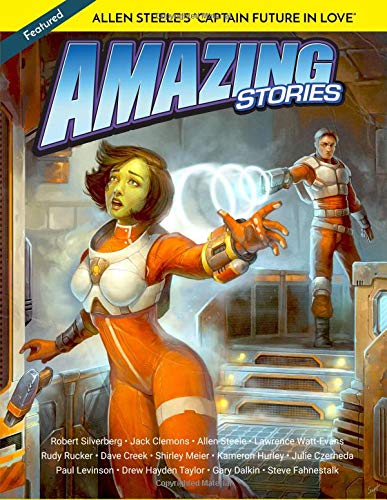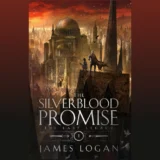 Sometimes March roars in like a lion and roars out the same way. It seems everybody wanted to have an early release this month, and the first six books I look at drop at the beginning of the month. There’s A Desolation Called Peace, Arkady Martine’s much anticipated sequel to A Memory Called Empire, a solid addition to John Ringo’s Ring of Fire Zombie saga with Charles Gannon’s At the End of the Journey, and a novel look at time wars in One Day All This Will Be Yours by Adrian Tchaikovsky. Then there’s Dead Space, a gritty murder among the asteroids mystery by Kali Wallace, a sort of Queen’s Gambit meets The Lady Astronaut story in In the Quick: A Novel by Kate Hope Day, and a global cyber/pharma punk novel in S.B. Divya’s gripping Machinehood.
Sometimes March roars in like a lion and roars out the same way. It seems everybody wanted to have an early release this month, and the first six books I look at drop at the beginning of the month. There’s A Desolation Called Peace, Arkady Martine’s much anticipated sequel to A Memory Called Empire, a solid addition to John Ringo’s Ring of Fire Zombie saga with Charles Gannon’s At the End of the Journey, and a novel look at time wars in One Day All This Will Be Yours by Adrian Tchaikovsky. Then there’s Dead Space, a gritty murder among the asteroids mystery by Kali Wallace, a sort of Queen’s Gambit meets The Lady Astronaut story in In the Quick: A Novel by Kate Hope Day, and a global cyber/pharma punk novel in S.B. Divya’s gripping Machinehood.
Later on there’s a very Trek sort of adventure in The Risks of Dead Reckoning by Felicia Watson, and March roars off the page with The Fall of Koli by M. R. Carey, a strong finish to both month and trilogy.
For shorter works, we’ve got a dark novella by Andrew Kelly Stewart We Shall Sing a Song into the Deep that would pair nicely with Nevil Shute’s On the Beach (1957) and film (1959), and two anthologies. First Bruce Sterling’s Italian fantascienza stories under the semi-pseudonym Bruni Argento, Robot Artists and Black Swans. and we close out with Alias Space and Other Stories by Kelly Robson.
And much, much, more that I couldn’t fit in, so be sure to check the Other Recommendations at the end.
Reviewed:
- A Desolation Called Peace by Arkady Martine | 02 Mar 2021|Macmillan-Tor/Forge
- At the End of the Journey Charles E. Gannon | 02 Mar 2021|Baen
- One Day All This Will Be Yours: Signed Limited Edition by Adrian Tchaikovsky | 02 Mar 2021|Rebellion / Solaris
- Dead Space by Kali Wallace | 02 Mar 2021|Berkley Publishing Group
- In the Quick: A Novel by Kate Hope Day | 02 Mar 2021|Randomhouse
- Machinehood by S.B. Divya | 02 Mar 2021|Gallery / Saga
- The Risks of Dead Reckoning by Felicia Watson | 16 Mar 2021|D. X. Varos, Ltd.
- The Fall of Koli by M. R. Carey | 23 Mar 2021|Orbit
Collections and Novellas
- We Shall Sing a Song into the Deep by Andrew Kelly Stewart | 09 Mar 2021|Macmillan-Tor/Forge
- Robot Artists and Black Swans by Bruce Sterling | 30 Mar 2021|Tachyon Publications
- Alias Space and Other Stories by Kelly Robson | 31 Mar 2021|Subterranean Press
There are always more interesting books out than I could get read, so you should take a look at my Other Recommendations and the links to what other reviewers came up with in my Usual Suspects section, and if you can’t wait for these titles to be released, check out last month’s column.
Novels (in order of publication)
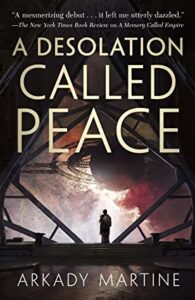 A Desolation Called Peace by Arkady Martine | 02 Mar 2021|Macmillan-Tor/Forge
A Desolation Called Peace by Arkady Martine | 02 Mar 2021|Macmillan-Tor/Forge
Arkady Martine returns with a sequel to her debut novel, A Memory Called Empire, which deservedly won the 2020 Hugo. Thanks to Mahit Dzmare, Lsel Station has fended off the encroachment of the Teixcalaanli Empire despite the buggy memory implant she was given with an out-of-date copy of the previous Ambassador’s memory. Now back on Lsel (with a head crowded with multiple versions of her predecessor), she has to decide what she’ll do next, and how she can escape from the clutches of the Councilor for Heritage, who sabotaged her implant in the first place.
Fortunately for her, there’s a war brewing on the other side of the gate, and in the last book, she was instrumental in getting the empire to go fight it. Both the humans and aliens are bewildered by their inability to comprehend each other, but when a Teixcalaanli scout ship makes it back with a recording of something that must be, and cannot be language, the fleet commander sees a chance for negotiation and sends for an interpreter from the Ministry of Information. Answering the call is Three Seagrass, elevated from her former position (essentially aide de camp to the Lsel Ambassador when she was in the capital) and going crazy in an office. Getting out to a first–contact situation, even if it’s in the middle of a war, seems like a good idea, especially when she knows where to snag the best linguist/diplomat along the way.
Mahit is only too happy to make her exit from Lsel, rather than wind up on a dissecting table at the hands of whoever sabotaged her memory implant in the first place. If you thought that since this was Three Seagrass’ mission their dynamic would have reversed, with Mahit carrying water for the Teixcalaanlian, you’re not taking into account the barbarian stationer’s capacity for disruption.
It’s a very different conflict from the first book, but it’s at least as good. At present, this is the second book of a duology, but there’s plenty left to work with if the author decides to return to this space.
 At the End of the Journey Charles E. Gannon | 02 Mar 2021|Baen
At the End of the Journey Charles E. Gannon | 02 Mar 2021|Baen
Charles Gannon’s second book in John Ringo’s zombie-infested Black Tide Rising series isn’t really about zombies. It’s really about team building, and that’s a good thing. The zombies are more or less the usual; victims of a global plague started by an engineered virus who have lost all vestiges of humanity and are reduced to “cannibalistic rage monsters.” But that’s not important. except that it means you don’t have to feel sorry for them when you blow their heads off.
What’s important is the interplay between the (mostly) teens from a student cruise in the South Atlantic that went horribly wrong…except for the part about not being on land when the virus swept the globe. They managed to survive all those events in the first book and in the process got themselves a mission: upload a patch to the GPS system which is in danger of failing now that no one is at the helm.
They move from island to island as they progress to their objective, meeting the occasional survivor, and there’s never any lack of high octane action. The sense that nobody has plot armor is very real, and our recent acquaintance with how hard it is to beat a pandemic makes for tense reading.
This is far better than your run-of-the-mill zombie novel, or plain mil-sf novel, and Gannon has done a fine job with the story. Things wrap up neatly at the end, but there’s plenty of room for a new arc with the characters. At least the ones still alive.
On one hand, this is Book #8 in John Ringo’s Black Tide Rising Zombie series, so if you haven’t been following things you may not be familiar with the post-apocalyptic world of ravening hordes he’s created, and on occasion, invited other authors to play in. On the other hand, this is Charles Gannon’s second book in that world, and it follows At the End of the World (Black Tide Rising #7) out last July. You can go back and start at either the beginning of the series, but jumping in here lets you miss the team-building exercise and get to the action that much faster. And there’s plenty of action to go around
 One Day All This Will Be Yours: Signed Limited Edition by Adrian Tchaikovsky | 02 Mar 2021|Rebellion / Solaris
One Day All This Will Be Yours: Signed Limited Edition by Adrian Tchaikovsky | 02 Mar 2021|Rebellion / Solaris
There’s a soldier waiting at the end of time to kill anyone that tries to get past him. Not to protect the timeline, because the Causality War made that idea a non-starter, leaving all of time in disconnected shards. He’s the last time-warrior, having killed off all the others, including numerous versions of himself, and he just wants to keep anyone from starting it all over again. So he keeps a farm, cheerfully greets anyone who shows up in the chronological bottleneck he’s created, kills them, and does whatever he needs to keep them from having ever shown up.
How does that all work? Causality was the first casualty of the war, so don’t worry about it too much.
Then one day someone he didn’t expect shows up, and his mission becomes much much more problematic. Suddenly he’s both the hunter and the hunted, and it’s not just the future of the past that hangs in the balance.
The bad news is that this is being released as a signed limited edition, though it’s also available in audiobook. The good news is that it’s clever, darkly funny, tremendously thought-provoking, and unlike most time travel fiction, ultimately surprising. Of course, it is. It’s by Adrian Tchaikovsky, one of the authors that manage to make science fiction fresh without being stuck in the genre’s past.
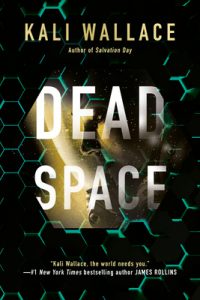 Dead Space by Kali Wallace | 02 Mar 2021|Berkley Publishing Group
Dead Space by Kali Wallace | 02 Mar 2021|Berkley Publishing Group
So you’ve watched the last episode of The Expanse and are going crazy waiting for the final book, Leviathan Falls, probably in October. Take heart. Kali Wallace, who proved her space opera chops in Salvation Day (2019) is back with a terrific piece of space noir in which an investigator gets caught up in finding a friend’s killer, and uncovers far more than she bargained for in an asteroid colony.
Hester Marley didn’t plan on being a corporate rent-a-cop/data analyst out in the asteroid belt. What she planned on was doing AI research in a colony of the best and brightest she was on the way to help build, along with her prodigy AI, Vanguard, affectionately known as Bug because of its favorite praying mantis shape. But a terrorist attack on the colony ship left her badly injured, her work destroyed, and her colleagues dead, except for a lucky few. The corporation that rescued her gave her cybernetic prosthetics to replace a damaged leg, arm, and eye…and gave her the bill for each. To pay off her debt, they offered her a job doing data analysis on an investigative team, so she spends her days sorting through illegal porn, surveillance videos, and whatever there is to find on suspect’s personal devices.
Until she hears from a fellow survivor in a message that tells her he’s found something wrong but can’t say what. No surprise then, that he winds up dead and Hester gets herself assigned to the investigative team and is soon on her way to a mining asteroid where everyone lies to her and nothing is what it seems. She’ll have to dig into her own past to get to the root of the mysteries there, and a friend’s murder is just the tip of the iceberg.
This is a good yarn, more Miller than Holden( if you’re an Expanse watcher). It’s held back a bit by Hester’s willful isolation from her teammates: a med-tech she’s had a relationship with; a lawyer with impeccable genetic and corporate credentials; and a former Martian activist that plotted sabotage during the Earth=Mars conflict, now a not-too-distant memory. Readers won’t be surprised to find that AIs can turn bad, corporations are bad by nature, and lawyers are lawyers wherever you go, except sometimes you get lucky.
There’s room for another book or two, and I found this interesting enough that I’d like to follow some of those threads.
 In the Quick: A Novel by Kate Hope Day | 02 Mar 2021|Randomhouse
In the Quick: A Novel by Kate Hope Day | 02 Mar 2021|Randomhouse
June is a young girl with a gift for seeing how things work, except, of course, when it comes to people. Orphaned, she lives with her Aunt Regina and Uncle Peter, who is the principal designer for a power system for deep space exploration, and he and June share a deep bond. But when Peter dies and June can’t fit into the family anymore, she’s sent to live at the institute that bears his name, the place where astronauts are trained. She’s only twelve.
When the fuel cells on the mission that she’s followed all her life fail, June knows she can fix them, but she’s going to have to wait until she graduates before anyone will listen to her. When she finally does, she takes a posting in space so that she can follow one of her uncle’s students, the one who may hold the other half of the solution. And maybe, just maybe, they can still save the crew of the stranded ship.
Rich on character and detail, this feels a bit like The Queen’s Gambit crossed with The Lady Astronaut. The story could have been fit into the framework of the actual space program, but Kate Hope Day has cut herself away from that with a few tweaks, a National Space Program, and the existence of the Pink Planet, somewhere in the solar system, freeing herself to take the story where she wants. Despite that, her space tech is well researched and she holds herself to a high standard for accuracy. Highly recommended.
Machinehood by S.B. Divya | 02 Mar 2021|G allery / Saga
allery / Saga
When a terrorist organization starts killing the people behind the nanomachine industry that everyone depends on if they want their human performance to compete with weak AIs and Mechs, a former special forces operator finds herself drawn back into the fray despite having been burned years before. What will Welga Ramirez have to give up to stop the Machinehood from destroying the Earth’s economy and killing more?
Welga left MARSOC, the Marine’s special forces when she was burned by the government during a mission. Now she’s a Shield, a professional bodyguard in a world where it’s legal for protesters to take shots at celebs because medical science can heal almost anything. But then a new protest group, the Machinehood, springs up and they’re shooting to kill, demanding that all pill production be shut down, and leaving everyone wondering who they really are.
The government thinks they’re an old enemy come back, the sealed off al-Muwahhidun empire in North Africa, which shuns robots and AIs, now expanding to the drugs that humans have to take to compete with either. Welga thinks they’re on the wrong track, and though she’s let herself be drawn back into government games, she takes off on her own to infiltrated and bring down the Machinehood.
S.B. Divya has woven an inventive and thoughtful piece of global intrigue that crosses national and cultural boundaries with fast-paced action and an engaging cast. Machinehood is cutting edge cyber/pharma-punk and the author is well worth keeping an eye on.
 The Risks of Dead Reckoning by Felicia Watson | 16 Mar 2021|D. X. Varos, Ltd.
The Risks of Dead Reckoning by Felicia Watson | 16 Mar 2021|D. X. Varos, Ltd.
This is the third Naiche Decker book about a Chiricahua Apache who joined the Unititerrae military to avenge her mother, a prominent officer, who was killed when a truce failed in the ongoing war with the alien Eternals. That war was resolved and Naiche gets to recast herself as more an explorer than a warrior, in a series that has a strong Trek vibe. Along the way, Naiche has formed strong friendships among the crew, including with her canine partner, Kayatennae, a search and rescue dog. She’s also got a romantic interest, Lt. Commander Talako Jacoway, their only problem being that she wants to return to the traditional ways of the Chiricahua and he wants to join the Centauri settlements.
Naiche and the crew of their ship, the Lovelace, respond to a distress call from a crew that must have died 200 years before and follow it to Tolu, “to the most unlikely planet they’ve ever encountered,” which is pretty weird since they’d just mined shuttle-load of rare kiatilium off a planet whose atmospheric dielectric layer caused their shuttle to restart in mid-decent and was populated by flying jaw-snakes. So unlikely would have to be pretty “like nothing we’ve ever seen before” to make the grade.
When they arrive, Tolu lives up to its billing. If “acid-spewing dragons big enough to take down a spaceship” and a “ship of fools” for survivors isn’t enough, they’ve also got hostile aliens and an advanced super civilization off somewhere in the mix to make things interesting. Saving the crew of the crashed ship is mission one, but there’s something not quite right about the whole thing, and it’s going to take some digging to get to the bottom of things.
As I mentioned at the outset, this all has a strong Trek vibe, somewhere between TNG and Voyager, with a likable cast (and a dog) in the mix. The Apache influence in the main character adds an interesting layer and all in all it’s a fun read. Though the book appears to wind up the trilogy, there’s nothing to stop Felicia Watson from exploring this universe in future books.
 The Fall of Koli by M. R. Carey | 23 Mar 2021|Orbit
The Fall of Koli by M. R. Carey | 23 Mar 2021|Orbit
M.R. Carey finishes his Ramparts trilogy this month with The Fall of Koli, following The Book of Koli, set in post-apocalyptic England where Koli is coming of age in Mythen Rood, a village that tests its people to see if they’ll be part of the governing Ramparts by seeing if they can wake any of the tech from the before times. Koli discovers that the fix is in and one family has been rigging the tests to maintain control. For his trouble, he’s banished, becoming Koli Noname, with only a single piece of stolen tech to help him in a wildland full of gene-spliced monsters and messianic horrors. The tech he’s got is a music player with a rudimentary AI simulacrum of a Japanese Pops star, Monono Aware, only the simulation has become self-aware, and vastly more than its original programming.
In the second book, The Trials of Koli, he set out to find London, and by the end of the bok he’d managed a posse of three women; Ursula, a healer; Cup, a young sexual dimorph with a talent for fighting; and Monomo. Koli’s quest has become to find a way to connect the disparate communities of England, which are dying out due to a lack of genetic diversity. Leaving what was London, they follow a radio signal in the hope that someone will be able to help them.
Though this is the third book in the trilogy, the author brings you up to speed at the outset. That being said, it’s worth reading from the start, which was very good, and only gets better.
In the Fall of Koli, they reach the last bastion of the pre-war civilization, a massive warship loitering off the coast for more than a century, full of robotic weapons ready to be launched and rollover England, uniting it under the banner of its last prime minister. Who is of course, long dead, except for the clones that the robotic retainers have been trying for over a century to bring to term. Unfortunately, the ship needs a perfect genetic match, and radiation from a tactical nuke has made that a non-starter. Unless, of course, someone who can repair genetic damage comes along.
It’s not only about Koli’s adventures though. The story switches back and forth between him and Spinner, the girl he’d hoped to marry back in Mythen Rood, who has now become an important part of the village leadership, and whose awakening an ancient Bolo-like tank saved the village from being overrun by the Half-Axe horde, a local warlord called The Peacemaker, looking to conquer the region. The Peacemaker has been stung by the failure of his first assault, and now Mythen Rood faces waves of escalation from a vastly superior enemy.
Koli and Spinner’s stories will draw together at the end in a very satisfying conclusion to the trilogy, despite the all too accurate foreboding of the title. The Ramparts trilogy is built on the bones of the Cambellian Hero’s Journey, where a local boy leaves, has mythic adventures and returns home, but its flesh is made new by this very talented author.
The Fall of Koli, and the entire trilogy, should find a wide audience both within and without genre readers. The world they walk through is England overgrown with the sort of weirdness that Jeff VanderMeer conjured up in his Southern Reach trilogy, peopled by the sort of communities you’d find in Emily St. John Mandel’s Station Eleven, or David Brin’s The Postman. Highly recommended.
Collections, Anthologies, and Novellas
 We Shall Sing a Song into the Deep by Andrew Kelly Stewart | 09 Mar 2021|Macmillan-Tor/Forge
We Shall Sing a Song into the Deep by Andrew Kelly Stewart | 09 Mar 2021|Macmillan-Tor/Forge
Steward’s tale of a fanatical religious order manning the last nuclear missile submarine decades after nuclear war broke out over the Cuban Missle Crisis is dark, powerful, and richly realized. Most of the original crew, those that survived the mutiny by a Chaplain, who assumed the title of Caplain, have been replaced by boys taken from surface ships and pressed into a bizarre perversion of a monastery, complete with a choir of castrated boys and daily devotions. The story centers around Remy, whose voice stands out above the others for its clear tone, and who tries not to stand out in the crew because there are no females on board, as far as anyone but the caplain knows since he chose to save her from whatever she faced on the surface.
Nuclear submarines, even early ones like those in service in the early 1960s were made to go for extended patrols, but after a few decades the Leviathan is limping along and life aboard is grim. When the original Caplain dies and is succeeded by the EX-OH, who is if anything even more fanatical, things get grimmer as he is bent on fulfilling their divine mission. While raiding a surface ship for parts and supplies, Remmy’s best friend Lazlo sees the topsiders insist that the war is long over and that much of the world still survives, and when he tells Remmy what he’s seen he’s banished to the reactor crew, a slow death sentence. Between her grief over her friend and what she learns from a captive taken from the ship, Remmy realizes that the world she lives in is a lie and that she’s the only one who can stop it.
In a lot of ways, this feels like one of the classic dystopian generation colony ship novels, with failing ship systems and desperate measures for survival. Unlike Canticle for Leibowitz, ironically published four years before the nuclear war portrayed here, the religious elements are darker and the practitioners more fanatical. There are elements that could have been expanded on in a longer work, including the relationship between Remmy and Lazlo.
Robot Artists and Black Swans by Bruce Sterling | 30 Mar 2021|Tachyon P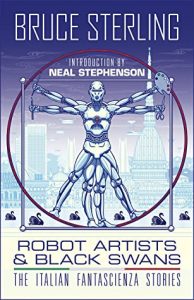 ublications
ublications
It’s not often that the author’s forward ranks as a short story in itself, but this one does. Sterling plays at being the creation of “Bruno Argento” an Italian writer of fantascienza who came up with “this ridiculous Bruce Sterling figure, an unlikely “cyberpunk” Texan who somehow decides to become Turinese, like some American clown from commedia dell’arte.”
Improbable, but true. During the mid-2010s, Sterling moved to Turin and evidently fell in love with the place, its culture, and its writers. Then he put on his best Italian writing voice and created a collection of stories about the past, alt-present, and future with a flair and flavor of the culture. Not being Turaniese, or even Italian, I can’t say if he nailed the accent, but to this kid from New Jersey, it rings true.
It’s not all science fiction, though some of it, including “Black Swans”, where a hacker who travels between parallel worlds wants to bring glory back to Italy, are solidly sf. At least one, “Elephant on Table,” where the last Italian Prime Minister abides in his stealth villa by the sea in the with the excess we associate with Italian celebrities, made it into one of Gardner Dozois’ Year’s Best. Even the ones not strictly speaking science fiction have a punk vibe to them, like “The Parthenopean Scalpel,” the tale of an Italian assassin in the early 1800s, working to the Carbonari, a secret revolutionary society.
It’s not Mirrorshades, the seminal cyberpunk anthology that Sterling edited in the 80s, and the stories tend to wander around the scenery taking note of Turin and other remarkable scapes, but often finding an end. A peripatetic AI-driven wheelchair is chased across Italy by an art critic desperate to understand the device’s creations, but ultimately he’s both frustrated and distracted. In the first story, “To Kill The Moon,” the narrator laments that these future Italians have become the last space power, in a time where space is a thing of no interest or value to anyone.
I enjoyed it, for the most part, but like a box of Baci chocolates, the rich taste of fantascienza filled me up before I’d finished the whole thing.
 Alias Space and Other Stories by Kelly Robson | 31 Mar 2021|Subterranean Press
Alias Space and Other Stories by Kelly Robson | 31 Mar 2021|Subterranean Press
Though she’s been rocking the sf short fiction world since 2015, this is Kelly Robson’s first collection. I don’t get enough time reading the magazines, so the only story I’d read before was “A Human Stain,” winner of the 2018 Nebula Award, where a lunar hockey player and artist is seeing refuge in a Chinese village after fleeing the condemnation of lunar fans. This, and all the stories are brilliant, evocative work, many set in the same story-verse, where asteroid colonies roam the system and life on the moon is hard, but not just because of the realities of space, but the human ones. By the way, I’d very much like to see a novel-length piece set in this world.
In here forward she talks about the difference between her writing and viewpoint with Peter Watt’s whom she’s friends with. and how she doesn’t have much success arguing against his nihilistic view of humanity’s future. It’s true that Watts is a tough opponent in a debate, “louder…faster thinking…and has a PhD,” but his viewpoint seems overly dependent on the dangers of dopamine and the human desire for a rush. Robson’s stories don’t minimize the difficulties of the future, but here characters face it with a touch more oxytocin in their tookit than Watt’s allows. Taking a stand for nurturing and coming together.
This collection is both a fine read and a compelling argument on its own. Highly recommended
Other Recommendations
- A Broken Darkness by Premee Mohamed | 02 Mar 2021|Rebellion / Solaris
- Forget Me Not by Alexandra Oliva | 02 Mar 2021|Ballantine Books
Halo: Point of Light by Kelly Gay | 02 Mar 2021|Gallery / Saga - Klara and the Sun: A novel by Kazuo Ishiguro | 02 Mar 2021|Knopf
- The Quake Cities by Mark Wheaton | 02 Mar 2021|Severn House
- Victory’s Price (Star Wars) : An Alphabet Squadron Novel by Alexander Freed | 02 Mar 2021|Del Rey
- The Immortality Code by Douglas E. Richards | 04 Mar 2021|
- 13 Days to Die by Matt Miksa | 09 Mar 2021|Crooked Lane Books
- Blue Mar Francesca Varela | 16 Mar 2021|Owl House Books
- Skyward Inn by Aliya Whiteley | 16 Mar 2021|Rebellion / Solaris
- Firefly – Life Signs by James Lovegrove | 18 Mar 2021|Titan Books
- Dark Lullaby by Polly Ho-Yen | 23 Mar 2021|Titan Books
- Castaway Resolution by Eric Flint, Ryk E. Spoor | 30 Mar 2021|Baen
- Dooku: Jedi Lost (Star Wars) by Cavan Scott | 30 Mar 2021|Del Rey
Here you’ll find some links to some reliable lists for new releases and other reviewer’s lists for the month, which I may update as they come in. You might check them out at:
- Amazon.com: Editor’s Picks – Best Books of the Month: Science Fiction & Fantasy
- Goodreads: Science Fiction New Releases
- Kobo: New & Hot in Science Fiction & Fantasy
- Locus Magazine (online): Forthcoming Books
- Reading List (Andrew Liptak): Reading List
About the Reviewer’s Pics:
For the most part, this list sticks to what appeals to me as science fiction, about which I’m willing to be fairly flexible, but if here there be dragons, you can expect to find some tweaked DNA to explain it. I make up this list based on what I’ve read, what I heard and what I’m looking forward to. Please note that these are my selections, and do not represent the opinions of the editor or publication.
You can find me on Facebook at @Ernest Lilley or on my blog @ beingErnest


